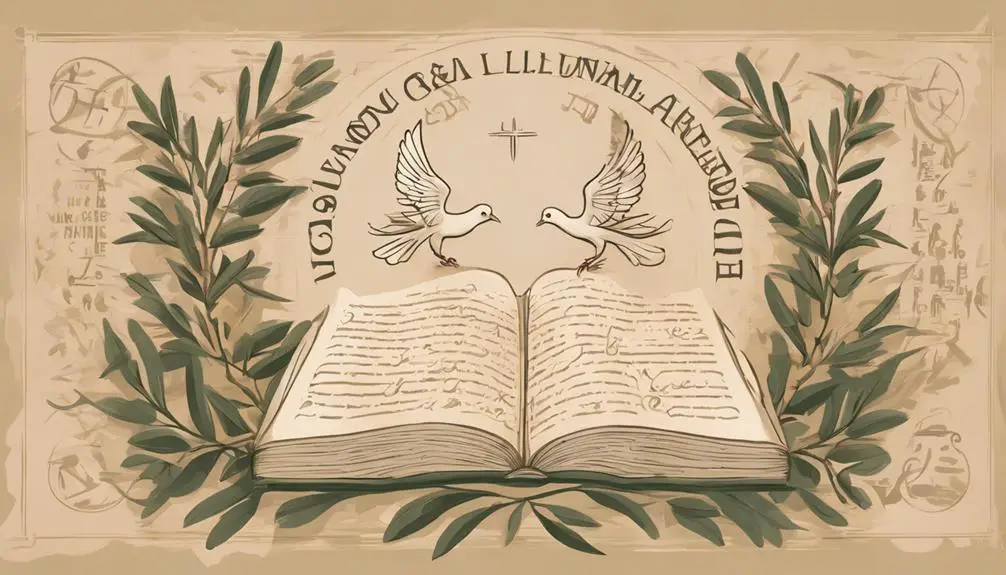Witness the profound journeys of biblical names starting with H, revealing timeless tales of faith, love, and resilience that inspire and intrigue.

Names That Start With H in the Bible
Just as Hercules embarked on his twelve labors, names starting with H in the Bible mark journeys of faith, love, and resilience that have shaped religious thought and personal beliefs for centuries.
You'll discover the steadfast faith of Hannah, Hosea's enduring love, Hezekiah's trust in divine guidance, Hagar's survival against the odds, and Habakkuk's honest questions. Each story offers unique insights into the human experience, encouraging a deeper exploration into how these ancient narratives continue to influence modern lives.
Let's uncover the layers of meaning behind these names, and perhaps, you'll find a reflection of your own journey in their stories.
Key Takeaways
- Biblical figures starting with H include Hannah, Hezekiah, Hagar, Habakkuk, and Hosea, each embodying deep faith and divine encounters.
- Hannah and Hezekiah's stories highlight the power of prayer and unwavering faith in overcoming challenges and receiving divine intervention.
- Hagar's encounter in the wilderness and Hosea's prophetic marriage symbolize divine guidance and the transformative power of faith.
- Habakkuk's dialogue with God underscores the significance of questioning and perseverance in one's faith journey, leading to divine wisdom and inspiration.
Hannah: A Story of Faith

Hannah's narrative in the Bible exemplifies a profound demonstration of faith, as she fervently prays for a child and vows to dedicate him to God's service. This account, deeply rooted in personal anguish and spiritual commitment, unfolds in the early chapters of 1 Samuel. Hannah's barrenness, in a culture that highly valued fertility, positioned her at the intersection of societal scorn and personal despair. Yet, it's within this context that her faith shines brightest.
Her prayer, a blend of desperation and hope, marks a pivotal moment in biblical history. It's not merely a plea for motherhood but a covenant with the divine, promising that if granted a son, she'd offer him back to God. This moment of profound faith underscores the narrative's emphasis on the power and intimacy of prayer, setting a precedent for future generations.
The subsequent birth of Samuel, a fulfillment of divine promise, signifies more than the answer to a fervent prayer. It heralds the arrival of a pivotal figure in Israel's history, underlining the narrative's theme that faith and dedication can alter destinies. Hannah's story, culminating in Samuel's birth, thus serves as a testament to the transformative power of faith, embedded within the larger tapestry of biblical history.
Hosea: The Prophet of Love

Shifting focus from the embodiment of faith in Hannah's story, we turn to Hosea, often celebrated as the Prophet of Love, whose messages of unconditional divine love amidst Israel's infidelity provide deep insights into the nature of God's covenant with His people. Hosea's marriage, often interpreted allegorically, signifies the tumultuous but unwavering commitment between God and Israel. Despite Israel's betrayal through idolatry, Hosea's narrative emphasizes divine love's enduring patience and willingness to forgive.
Hosea's personal life, particularly his marriage to Gomer, serves as a profound metaphor for this relationship. It's in the complexities and challenges of Hosea's marriage that we uncover layers of divine love's character—love that is steadfast, forgiving, and transformative.
To better understand this, consider the following table highlighting key aspects of Hosea's message:
Aspect |
Description |
Implication |
|---|---|---|
Hosea's Marriage |
Symbolizes God's covenant with Israel |
Reflects divine patience and love |
Divine Love |
Unconditional despite infidelity |
Demonstrates forgiveness and grace |
Israel's Infidelity |
Idolatry and spiritual unfaithfulness |
Challenges but does not sever divine covenant |
Restoration |
Promised return to faithfulness |
Symbolizes hope and renewal |
Hosea's narrative, rich in symbolism, invites you to ponder the depths of divine love and the complexities of faithfulness, urging a reflection on personal and communal relationships with the divine.
Hezekiah: A King's Trust in God

In the tumultuous narrative of Biblical history, King Hezekiah emerges as a paragon of unwavering faith, demonstrating an exceptional trust in God amid dire circumstances. During his reign, Hezekiah faces two significant challenges that test his faith: a life-threatening illness and the menacing Assyrian siege of Jerusalem.
Hezekiah's healing is a testament to his faith. When confronted with death, he turns not to the medical wisdom of his time but to prayer, seeking God's mercy. His plea is answered with a promise of fifteen additional years of life, a sign of divine favor and the power of trust in God's will. This miraculous recovery serves not only as a personal victory for Hezekiah but also as an encouraging testament to the power of faith for all believers.
The Assyrian siege of Jerusalem further illustrates Hezekiah's reliance on divine intervention. Faced with the overwhelming might of the Assyrian army, Hezekiah doesn't succumb to despair or seek aid from neighboring nations but instead prays for deliverance. His trust is rewarded when Jerusalem is miraculously spared, showcasing that faith in God can indeed alter the course of events, regardless of how insurmountable they may seem.
Hagar: Journey of Survival

Hagar's journey through the wilderness of Beersheba unfolds as a profound narrative of survival, resilience, and divine intervention in the face of abandonment and despair. Thrust into a desert ordeal, Hagar's story transcends mere survival to encompass a maternal legacy that has shaped generations. Her initial despair, mirrored by the desolate landscape, transforms into a testament of strength as she navigates the challenges of her environment.
This narrative isn't simply about enduring physical hardship but also about overcoming psychological and spiritual trials. Hagar's encounter with the divine in the wilderness is pivotal, marking a moment of profound revelation and promise. It's here that the theme of divine intervention becomes most apparent, offering not just physical sustenance but also a re-affirmation of her worth and future lineage.
Analyzing Hagar's journey, one can't ignore the intricate interplay between human vulnerability and divine grace. Her experience in the desert becomes a powerful metaphor for the trials and tribulations faced by those who are marginalized. Yet, it also serves as a beacon of hope, illustrating the potential for redemption and guidance amidst the bleakest circumstances.
Hagar's legacy, therefore, isn't just one of survival but of pioneering a maternal lineage underpinned by resilience, faith, and a divine covenant. This narrative invites reflection on the complexities of faith, the dynamics of power and disenfranchisement, and the enduring strength of the human spirit.
Habakkuk: Questioning and Trusting

Habakkuk's narrative delves deep into the complexities of faith, juxtaposing profound questions of divine justice with unwavering trust amidst turbulent times. You'll find his story isn't just about lamentation; it's a divine dialogue that showcases the essence of prophetic perseverance. Habakkuk challenges you to confront the apparent silence of God in the face of injustice, yet he also leads you to a place of steadfast faith.
Aspect |
Description |
Significance |
|---|---|---|
Divine Justice |
Habakkuk questions God's inaction against wrongdoing |
Encourages intellectual and spiritual inquiry |
Divine Dialogue |
Engages directly with God in a conversational manner |
Illustrates a personal, questioning faith |
Prophetic Perseverance |
Maintains faith despite not seeing immediate justice |
Demonstrates resilience and trust in God |
Trust Amidst Turbulence |
Concludes with a declaration of faith despite circumstances |
Highlights the power of unwavering belief |
Role of Faith |
Serves as a bridge between questioning and trusting |
Encourages a dynamic, evolving relationship with the divine |
Through this analytical lens, you're invited to explore how Habakkuk's journey from questioning to trusting offers profound insights into the nature of faith itself. His narrative, rich in both divine dialogue and prophetic perseverance, provides a compelling framework for understanding the dynamic relationship between doubt and devotion.
Frequently Asked Questions
How Do the Meanings of Names Starting With 'H' in the Bible Reflect the Cultural or Historical Context of the Time?
You're exploring how names reflect their era's cultural or historical backdrop. Hebrew naming conventions often imbued names with profound meanings, mirroring the significance of events, traits, or divine interactions.
Delving into historical name significance shows that these names weren't random but were carefully chosen to convey stories, aspirations, or blessings. This approach provides a fascinating lens through which to view the past, revealing the deep connections between names and the societal values they embody.
Are There Any Notable Differences in the Roles or Narratives of Male and Female Characters With Names Starting With 'H' in the Bible?
In exploring Biblical characters, you'll notice differences in narratives for male and female figures with 'H' names. H named heroines often embody specific H character virtues, contrasting their male counterparts.
These distinctions aren't just about gender but highlight the unique contributions and roles these individuals play in their stories. Analyzing these differences reveals how each character's journey and virtues reflect broader themes and teachings within the Biblical narrative.
How Do Non-Hebrew Speaking Cultures Interpret and Adapt the Names Starting With 'H' From the Bible in Their Naming Traditions?
You'll find that non-Hebrew speaking cultures often adapt H names from the Bible in unique ways, reflecting cultural interpretation differences.
These H name adaptations aren't just phonetic changes but are imbued with local meanings and nuances. Analyzing these variations reveals how deeply a culture can influence biblical names' interpretation, showcasing a blend of reverence and localization.
It's a fascinating study of how religious and cultural identities intersect and evolve.
What Are Some Less Known Stories or Characters in the Bible With Names Starting With 'H' That Didn't Make It Into Mainstream Biblical Teachings?
You're looking into the lesser-known biblical figures and narratives, specifically those beginning with 'H'. Delving into this, you'll uncover intriguing aspects like Hittite alliances, which play a crucial role in understanding ancient political dynamics.
Additionally, Hebron's significance, often overshadowed, emerges as a pivotal location in biblical history. These elements offer a deeper insight into the complexities and nuances of biblical stories, enriching your understanding of these ancient texts.
How Has Contemporary Media (Films, Literature, Art) Reinterpreted or Represented Characters With Names Starting With 'H' From the Bible, and What Impact Does This Have on Modern Audiences' Understanding of These Biblical Figures?
You've seen Hollywood adaptations breathe life into biblical figures, transforming ancient stories into cinematic epics.
Musical interpretations add a layer of emotional depth, making these characters resonate with you on a personal level.
This creative retelling impacts your understanding, blending the historical with the contemporary, and invites you to explore the complexities of these figures anew.
It's a scholarly journey, analyzing how these reinterpretations influence modern perceptions of spirituality and morality.
Conclusion
In sum, the biblical narratives of Hannah, Hosea, Hezekiah, Hagar, and Habakkuk offer profound insights into the human condition. Their stories are marked by faith, love, trust, survival, and the complex interplay between doubt and belief.
These narratives echo the trials and tribulations faced by every soul on its spiritual journey. Like Dante's pilgrim in the 'Divine Comedy,' these characters traverse their own infernos and paradises, teaching us that at the heart of every trial lies a hidden opportunity for redemption and understanding.



Sign up